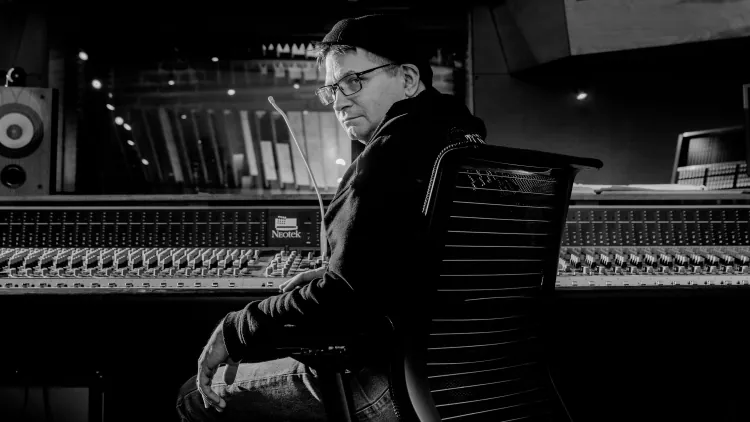Steve Albini Was Proof You Can Change
To a certain kind of listener, it sometimes felt like he was the last honest musician in the industry.

Nearly 20 years ago, my high-school calculus teacher introduced me to a book that would, although I didn’t realize it at the time, permanently reframe the way I thought about music. Written by the journalist Michael Azerrad, Our Band Could Be Your Life was a study of the 1980s independent-music landscape—of bands that had unconsciously responded to the commercialism found on MTV and mainstream rock radio by going underground, and by getting very weird. The book introduced me to groups such as Black Flag, Dinosaur Jr., and the Replacements, the last of which had beer-drunk songwriting and electric punk-rock hooks that soon made it my favorite band. These groups never became traditionally successful, Azzerad explained, but their careers represented a romantic and uncompromising approach to making music, which could too easily become cheapened by external forces.
And, in fact, many of the bands in the book had attempted to move up a level by signing to major labels, only to hit an artificial ceiling once it became clear that they couldn’t look or sound a certain way. But some of them had not even attempted this—they had recognized, as their careers were taking shape, that their personal beliefs were permanently at odds with the idea of participating in a notoriously predatory and corporate music industry. Among them—and the group that left the strongest impression on me—was a band called Big Black. Big Black was, even by the standards of its contemporaries, particularly abrasive; its serrated riffs and pummeling drumbeats sounded like they’d been recorded on the floor of an automobile factory. And the band’s philosophical stances were just as belligerent as its sound: It was led by a guitarist and singer named Steve Albini who seemed to take particular joy in broadcasting how he thought artists should behave, and denigrating everyone who did not live up to his standards. As Azerrad put it, “This was a band with policies.” Proving its ideological commitment, Big Black broke up in 1987 right after its best record came out—partly because one of the members wanted to attend law school, and also because the band was becoming a little too popular, which meant it was attracting the wrong kind of fans.
But Albini, who died yesterday at the age of 61 from a heart attack, did not stop making music. Over the next few decades, he continued to perform in his own bands and struck up a second career as a recording engineer (his preferred term, over producer), where he worked with hundreds of artists—among them Nirvana, the Pixies, PJ Harvey, Slint, Joanna Newsom, Robert Plant and Jimmy Page, Godspeed You! Black Emperor, the Jesus Lizard, and many, many, many more. It’s no exaggeration to say that Albini changed the trajectory of rock music for the better. He was especially good at capturing an artist as though they were playing right in front of you, a product of chemistry and ability rather than studio-driven artifice, and hiring Albini became a way for bands to signal their interest in being “realer,” both in sound and in attitude. His own outlook was perhaps best crystallized in his 1993 essay for The Baffler, “The Problem With Music,” in which he meticulously sketched out all the reasons making music on a major label was a sucker’s game. This idea, and its attendant aesthetic principles, felt just as important as the records themselves; to a certain kind of listener, it sometimes seemed like Albini was the last honest musician in the industry, though he would’ve shaken his head at such mythologizing.
I feel confident saying this because, in the summer of 2022, I had the opportunity to profile Albini for The Guardian, and I interviewed him on multiple occasions in Chicago, where he spent most of his life. I did not approach this task lightly. Foremost was the fact that I had been listening to his music for the past 20 years and didn’t want to seem like some fawning kid. But Albini had also incurred a reputation for being personally combative—which is saying something, given that inveterate punk rockers are not always known for their social graces. Over the years, he’d become infamous for saying a tremendous number of insulting things about other people, including bands he’d worked with. (“Never have I seen four cows more anxious to be led around by their nose rings,” he once wrote about the Pixies.) He seemed terribly smart, and suspicious of any nonsense. This is a bit of a broad statement, but allow me to say it: Anyone who has spent time around people who are really into music has met the type of person who seems totally obstinate, and borderline caustic, about why the bands they like are better than the bands you like. These people can be pretty irritating—I don’t want to be yelled at just because I like some Taylor Swift songs—but they inspire a shard of dread that perhaps their obstinacy is justified, that they have latched onto some way of thinking about art that the rest of us are too dull to perceive.
From afar, Albini seemed like the final boss of this mindset. Yet the Guardian profile had been assigned because Albini, in recent years, had begun to soften some of his adversarial instincts, at least in public. He still got worked up about bands he hated (especially Steely Dan) and about right-wing politicians—but he had explicitly apologized for the numerous offensive things he’d said throughout his life, which included using racial slurs and denigrating women. “A lot of things I said and did from an ignorant position of comfort and privilege are clearly awful and I regret them,” he wrote in a 2021 Twitter thread that went viral. This felt notable because it’s become popular, in recent years, for people to complain about the rise of cancel culture and the shifting standards for public speech. In the past, Albini had always claimed that his offensiveness was attached to some underlying principle, no matter how arbitrary it seemed to others, but he’d since become suspicious of the people who reveled in offensiveness for its own sake. “When you realize that the dumbest person in the argument is on your side, that means you’re on the wrong side,” he had told me about recalibrating his feelings.
So this was one dimension of the Albini I met: a man who, although still razor-sharp and hilarious, was clear-eyed about why he felt he should shed some of these more reactive traits of his former self. “It’s me owning up to my role in a shift in culture that directly caused harm to people I’m sympathetic with, and people I want to be a comrade to,” he said of why he had decided to be open about his evolved thinking. When I published the story, quite a few readers, and particularly men of his generation, said they were personally inspired by Albini’s perspective and growth—that if someone with his cutting reputation could be this reflective, then perhaps nobody else had an excuse for staying rude.
Just as striking, to me, was the way he talked about his job. Earlier in his career, he had been more insistent about how a record should sound, and had freely offered his opinions in the studio. Over time, he sloughed off this tendency and became more comfortable with recording musicians as they were and as they wanted to be. His rates remained affordable, and he was always personally available to record a band; for a reasonable fee, a local artist could get the guy who’d laid down Kurt Cobain’s guitar on “All Apologies.” He relished working with musicians “beneath the professional level,” as he put it to me—people for whom making music was part of a necessary impulse rather than any means of getting rich or famous. He was decidedly not sentimental about the famous artists he’d worked with (though he got a little giddy when we talked about Iggy Pop and the Stooges, whose reunion record he’d recorded). Instead, it was the everyday work of going to his studio and producing physical evidence of a band’s existence—no matter how big or small—that mattered the most. His greatest contribution to music, Kim Deal of the Pixies told me while I was reporting for the profile, was “every single person who has walked through that door and been treated with respect about their ideas.”
Albini did too much to be neatly summarized in any profile; I didn’t have the space in mine to dive too deeply into his most recent band, Shellac, which in a terrible coincidence is releasing a new record next week. But as I drafted, two things kept coming back to me: The first was that Albini had been unafraid to own up to his past rather than wave it off or double down on his positions. The second was that he talked about music not as some expression of ego but as a creative practice worth maintaining because it enriched your life. To hear this—and in such an unpretentious way—was no small thing. This was not mere plate-spinning from a guy who liked to hear himself talk; these were tightly reasoned, directly stated beliefs that he’d stress-tested in his own life and were reflected in how he carried himself.
Unlike many of its peers, Big Black never really reunited, other than for a single performance at an anniversary show for its former record label. “I’m not a nostalgic person by nature,” Albini had told me. “I don’t think about the past very much.” I believed him, but one of my final questions was how he hoped his work would be regarded, should he have to retire tomorrow. I’ll reproduce his answer in full, because I was struck by it at the moment, and I feel heartened thinking about it now:
“I don’t give a shit. I’m doing it, and that’s what matters to me—the fact that I get to keep doing it, that’s the whole basis of it. I was doing it yesterday, I’m gonna do it tomorrow, and I’m gonna carry on doing it. Other people can figure out if they were happy about that, or not. I don’t care what they say; I’m doing it because I find value in it. I find value in being part of this culture, and preserving my peers’ artistic output. I find value in that, as my role: being the person responsible for making the record that someone will hear in 50 years to find out what some band sounded like. How will people know what our culture was like now, in 50 or 100 years? Well, they can read what survives the great digital void, and they can listen to what music survives. And I just want to make sure that I do a good job on the music that survives, you know?”
When you buy a book using a link on this page, we receive a commission. Thank you for supporting The Atlantic.
What's Your Reaction?




















